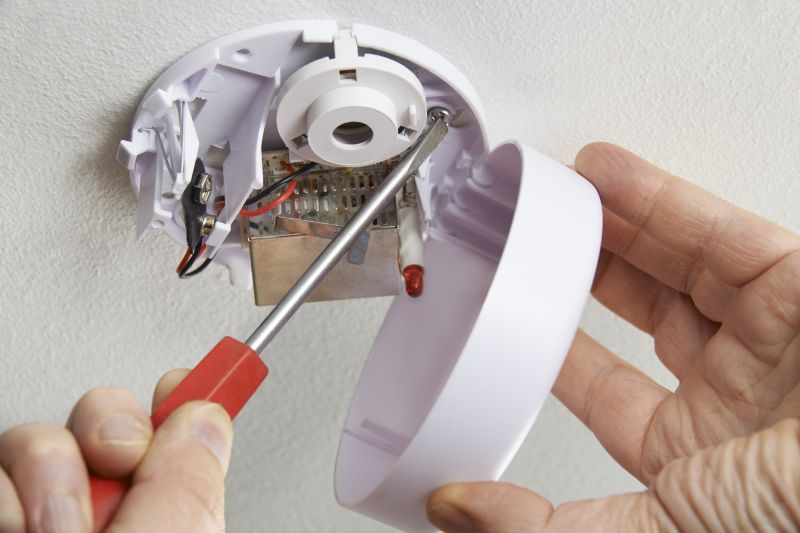Popular Fire Alarm Battery Replacements for Seamless Maintenance
Discover the most trusted batteries that make replacing fire alarm power sources quick, easy, and effective.
 Replacing fire alarm batteries is a routine maintenance task essential for ensuring the continued safety and functionality of home or commercial fire detection systems. When a fire alarm's battery begins to weaken or drain, it can cause the device to emit warning beeps or chirps, signaling the need for replacement. Selecting the right type of battery is crucial to maintain reliable operation and avoid false alarms or system failures. Common options include standard alkaline batteries, lithium batteries, and rechargeable variants, each with their own advantages depending on the alarm model and usage conditions.
Replacing fire alarm batteries is a routine maintenance task essential for ensuring the continued safety and functionality of home or commercial fire detection systems. When a fire alarm's battery begins to weaken or drain, it can cause the device to emit warning beeps or chirps, signaling the need for replacement. Selecting the right type of battery is crucial to maintain reliable operation and avoid false alarms or system failures. Common options include standard alkaline batteries, lithium batteries, and rechargeable variants, each with their own advantages depending on the alarm model and usage conditions.
Top Overall Option
Alkaline Battery Pack for Smoke Detectors
This versatile alkaline battery pack offers reliable power for a wide range of smoke detectors and fire alarms. Known for its affordability and consistent performance, it is suitable for everyday replacement needs. The pack typically includes multiple batteries, making it convenient for households or facilities with several alarms. Its long shelf life and stable voltage ensure alarms operate smoothly, providing peace of mind. Always verify compatibility with your specific device before installation.
Types of Products For Fire Alarm Battery Replacements
Alkaline Batteries
Standard alkaline batteries are common and suitable for most basic fire alarms, offering affordability and reliable power.
Lithium Batteries
Lithium batteries provide longer shelf life and consistent performance in various temperatures, ideal for critical safety devices.
Rechargeable Batteries
Rechargeable options are environmentally friendly and reusable, requiring compatible chargers and regular maintenance.
10-Year Sealed Batteries
Sealed long-life batteries reduce the frequency of replacements, suitable for hard-to-access locations.
9V Batteries
Commonly used in older or specific models of smoke detectors, providing dependable power.
Coin Cell Batteries
Small, button-style batteries used in some specialized alarms and detectors.
Rechargeable Lithium-Ion Batteries
High-capacity rechargeable batteries suitable for advanced or custom alarm systems.
Hybrid Battery Systems
Combining rechargeable and disposable features for flexible, long-term use.
Popular Choices
Widely used and readily available, these batteries are a common choice for everyday fire alarm maintenance.
Known for durability and performance in varied conditions, these are trending for critical safety applications.
Increasingly popular for their eco-friendly profile and cost savings over time.
Gaining popularity for minimal maintenance and long-term reliability in hard-to-reach areas.
A common choice for older models or specific alarm types, appreciated for their availability.
Used in specialized detectors, these small batteries are trending for compact alarm designs.
Understanding the different battery types and their compatibility with your fire alarm is important. Alkaline batteries are widely available and generally cost-effective, suitable for most basic smoke detectors. Lithium batteries tend to offer longer shelf life and better performance in extreme temperatures, making them a good choice for areas with temperature fluctuations. Rechargeable batteries can be an environmentally friendly option, but they require a compatible charger and may need more frequent maintenance. When selecting batteries, always check the manufacturer's specifications and recommendations to ensure optimal performance.
Proper installation is key to ensuring safety and reliability. Before replacing batteries, turn off the alarm and carefully remove the old power source. Insert the new battery, paying close attention to polarity markings. Regularly testing the alarm after battery replacement helps confirm that the device is functioning correctly. It is also advisable to replace batteries at least once a year or whenever the alarm indicates low power. Keeping spare batteries on hand can streamline maintenance and minimize downtime, especially in multi-unit buildings or commercial settings.
In addition to standard batteries, there are also specialized options such as sealed 10-year batteries designed for long-term use, reducing the need for frequent replacements. Some alarms are compatible with rechargeable or hybrid systems, offering flexible solutions tailored to specific needs. Overall, choosing the right batteries depends on factors like device compatibility, longevity, cost, and environmental conditions. Proper maintenance and timely replacements contribute significantly to the overall safety and effectiveness of fire detection systems.
Key Buying Considerations
- Compatibility with your specific fire alarm model is essential; always check manufacturer recommendations.
- Battery lifespan varies; consider long-life options for less frequent replacements.
- Shelf life can differ; select batteries with longer shelf stability for emergency preparedness.
- Temperature tolerance may be important depending on the location of the alarm, especially in outdoor or unheated areas.
- Recycling and disposal should be considered; choose batteries that are safe and compliant with local regulations.
- Cost per unit can vary significantly; balance affordability with performance and longevity.
- Rechargeable batteries may require compatible chargers and more maintenance but can be more sustainable.
- Sealed 10-year batteries reduce maintenance but are generally more expensive upfront.
- Check for leak-proof and corrosion-resistant features to ensure safety and durability.
- Ease of installation and removal can streamline maintenance routines.
- Consider the availability of replacement batteries in local stores or online for convenience.
- Battery voltage and capacity ratings should match the requirements of your alarm system.
- Brand reputation and user reviews can provide insights into reliability and performance.
- In multi-unit or commercial settings, having bulk packs or multiple replacements on hand can be beneficial.
- Always test alarms after replacing batteries to confirm proper operation.
